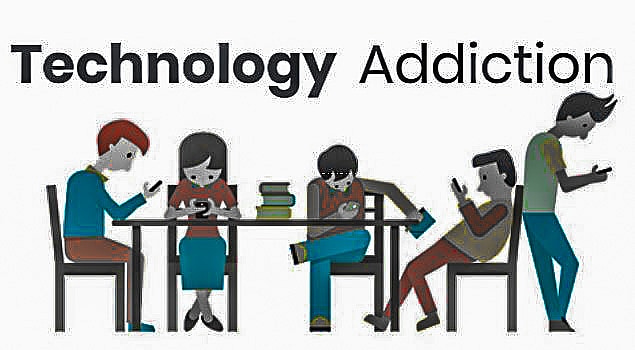In today’s hyper-connected world, technology has become integral to our daily lives. From smartphones and social media to streaming services and online gaming, digital devices and platforms offer endless opportunities for communication, entertainment, and productivity. While excessive use of technology is often associated with negative consequences, such as decreased productivity and social isolation, there are also potential benefits to be gained from moderate and mindful engagement with digital technology.
Table Of Contents
Exploring the Benefits of Technology Addiction: Finding Balance in the Digital Age

- Enhanced Connectivity:
One of the most significant benefits of technology addiction is enhanced connectivity. Through social media platforms, messaging apps, and video conferencing tools, individuals can stay connected with friends, family, and colleagues regardless of geographical distance. Technology facilitates instant communication and fosters community, allowing individuals to maintain relationships and support networks even during physical separation.
- Access to Information:
Technology addiction can provide individuals with unprecedented access to information and knowledge. Users can access many resources, including news articles, academic journals, online courses, and educational videos, with just a few clicks or taps. This democratization of information empowers individuals to pursue lifelong learning, explore new interests, and stay informed about current events and global issues.
- Increased Productivity:
Contrary to popular belief, technology addiction can increase productivity when used strategically. Productivity tools such as task management apps, digital calendars, and project management software can help individuals organize their tasks, set priorities, and track progress more efficiently. Additionally, digital collaboration platforms enable teams to collaborate remotely and streamline workflow processes, leading to greater efficiency and effectiveness in the workplace.
- Entertainment and Recreation:
Technology addiction can provide individuals with access to a wide range of entertainment and recreational activities. From streaming movies and TV shows to playing video games and listening to music, digital entertainment options offer endless opportunities for relaxation and enjoyment. Moreover, online communities and multiplayer gaming platforms allow individuals to connect with like-minded peers and engage in shared experiences, fostering a sense of belonging and camaraderie.
- Creative Expression:
Technology addiction can serve as a platform for creative expression and self-expression. Social media platforms, blogging websites, and digital art tools allow individuals to share their thoughts, ideas, and creativity with the world. Whether through writing, photography, graphic design, or music production, technology empowers individuals to unleash their creativity and reach a global audience with their work.
- Health and Wellness:
Technology addiction can also support individuals’ health and wellness goals. Fitness tracking apps, meditation apps, and online wellness communities enable individuals to monitor their physical and mental well-being, set health goals, and access peer support and motivation. Additionally, telemedicine services and health monitoring devices allow individuals to access medical care and advice remotely, improving access to healthcare services and promoting proactive health management.
How to Manage Technology Addiction: Strategies for Finding Balance in a Digital World

In today’s fast-paced digital age, technology has become integral to our daily lives. Set Boundaries and Limits:
The first step in managing technology addiction is establishing clear boundaries and limits around digital usage. Set specific time limits for digital devices and designate tech-free zones in your home, such as the bedroom or dining area. Establishing boundaries will help you regain control over your digital habits and prevent technology from encroaching on other areas of your life.
Practice Mindful Awareness:
Practice mindful awareness of your digital habits by paying attention to how you use technology and how it makes you feel. Notice any excessive or compulsive behaviour patterns and identify triggers that lead to increased technology use. By becoming more aware of your digital habits, you can take proactive steps to modify your behaviour and reduce the negative impact of technology addiction on your life.
Give Priority to in-person relationships:
Invest time and effort into nurturing real-life connections with friends, family, and loved ones. Schedule regular face-to-face interactions and engage in activities that don’t involve digital devices, such as going for a walk, having a meal together, or playing outdoor games. Building strong relationships offline will provide you with a sense of connection and fulfilment that technology alone cannot offer.
Practice Digital Detox:
Consider taking periodic breaks from technology by practising digital detox. Set aside designated periods, such as weekends or evenings, where you disconnect from all digital devices and focus on offline activities. Use this time to engage in hobbies, spend time outdoors, or relax and unwind without the constant distraction of technology.
Engage in Healthy Alternatives:
Replace unhealthy technology habits with healthy alternatives that promote well-being and personal growth. Instead of mindlessly scrolling through social media, try reading a book, practising mindfulness meditation, or pursuing a hobby you enjoy. Engaging in activities nourishing your mind, body, and soul will help reduce reliance on technology and enhance your overall quality of life.
Seek Professional Help if Needed:
If you find it challenging to manage technology addiction on your own, don’t hesitate to seek professional help. Consider contacting a therapist, counsellor, or support group specializing in technology addiction and digital wellness. A trained professional can provide personalized guidance, support, and resources to overcome technology addiction and regain control over your life.
Conclusion
In conclusion, while technology addiction is often associated with negative consequences, it’s important to recognize that moderate and mindful engagement with digital technology can also yield significant benefits. By leveraging technology to enhance connectivity, access information, increase productivity, facilitate entertainment and recreation, foster creative expression, and support health and wellness goals, individuals can find balance in the digital age and harness the power of technology to enrich their lives.





